
United States Coast Guard Cutter
Encyclopedia
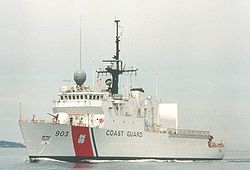
United States Coast Guard
The United States Coast Guard is a branch of the United States Armed Forces and one of the seven U.S. uniformed services. The Coast Guard is a maritime, military, multi-mission service unique among the military branches for having a maritime law enforcement mission and a federal regulatory agency...
for its commissioned
Ship commissioning
Ship commissioning is the act or ceremony of placing a ship in active service, and may be regarded as a particular application of the general concepts and practices of project commissioning. The term is most commonly applied to the placing of a warship in active duty with its country's military...
vessels. A Cutter is 65 feet (19.8 m) or greater in length, has a permanently assigned crew, and has accommodations for the crew to live aboard. They carry the ship prefix
Ship prefix
A ship prefix is a combination of letters, usually abbreviations, used in front of the name of a civilian or naval ship.Prefixes for civilian vessels may either identify the type of propulsion, such as "SS" for steamship, or purpose, such as "RV" for research vessel. Civilian prefixes are often...
USCGC.
History of the USCG cutters
The Revenue Marine and the Revenue Cutter Service, as it was known variously throughout the late 18th and the 19th centuries, referred to its ships as cutters. The term is English in origin and refers to a specific type of vessel, namely, "a small, decked ship with one mastMast (sailing)
The mast of a sailing vessel is a tall, vertical, or near vertical, spar, or arrangement of spars, which supports the sails. Large ships have several masts, with the size and configuration depending on the style of ship...
and bowsprit
Bowsprit
The bowsprit of a sailing vessel is a pole extending forward from the vessel's prow. It provides an anchor point for the forestay, allowing the fore-mast to be stepped farther forward on the hull.-Origin:...
, with a gaff
Gaff rig
Gaff rig is a sailing rig in which the sail is four-cornered, fore-and-aft rigged, controlled at its peak and, usually, its entire head by a spar called the gaff...
mainsail
Mainsail
A mainsail is a sail located behind the main mast of a sailing vessel.On a square rigged vessel, it is the lowest and largest sail on the main mast....
on a boom
Boom (sailing)
In sailing, a boom is a spar , along the foot of a fore and aft rigged sail, that greatly improves control of the angle and shape of the sail. The primary action of the boom is to keep the foot of the sail flatter when the sail angle is away from the centerline of the boat. The boom also serves...
, a square yard and topsail
Topsail
A topsail is a sail set above another sail; on square-rigged vessels further sails may be set above topsails.- Square rig :On a square rigged vessel, a topsail is a square sail rigged above the course sail and below the topgallant sail where carried...
, and two jib
Jib
A jib is a triangular staysail set ahead of the foremast of a sailing vessel. Its tack is fixed to the bowsprit, to the bow, or to the deck between the bowsprit and the foremost mast...
s or a jib and a staysail
Staysail
A staysail is a fore-and-aft rigged sail whose luff can be affixed to a stay running forward from a mast to the deck, the bowsprit or to another mast....
." By general usage, that term came to define any vessel of Great Britain's HM Customs and Excise and the term was adopted by the U.S. Treasury Department at the creation of what would become the Revenue Marine. Since that time, no matter what the vessel type, the service has referred to its vessels with permanently assigned crews as cutters.
First ten cutters
In 1790, Congress authorized the Secretary of the Treasury, Alexander HamiltonAlexander Hamilton
Alexander Hamilton was a Founding Father, soldier, economist, political philosopher, one of America's first constitutional lawyers and the first United States Secretary of the Treasury...
, to create a maritime service to enforce customs laws (1 Stat. L. 145, 175; 4 August 1790). Alternately known as the system of cutters, Revenue Service, and Revenue-Marine this service would officially be named the Revenue Cutter Service (12 Stat. L., 639) in 1863. This service was placed under the control of the Treasury Department.
.jpg)
- USRC VigilantUSRC VigilantVigilant was one of the original ten cutters employed by the Federal government of the United States which made up the Revenue Marine, or Revenue Cutter Service, later to become the United States Coast Guard.-Operational history:...
- USRC ActiveUSRC ActiveOne of the first ten revenue cutters, Active may have been the second of the ten cutters to enter service. The Columbian Centinel on 30 April 1791 noted:...
- USRC General GreenUSRC General GreenUSRC General Green was one of the first ten cutters operated by the US Revenue Cutter Service. She was named for the Revolutionary War hero Major General Nathanael Greene and note that her name was misspelled, probably by the man who oversaw her construction, the Collector of Customs in...
- USRC MassachusettsUSRC Massachusetts (1791)USRC Massachusetts was one of the first ten cutters operated by the United States' Revenue Cutter Service . She was built in Newburyport and served out of Boston. Massachusetts by tradition is held to be the first revenue cutter to enter active service...
- USRC ScammelUSRC ScammelUSRC Scammel was one of the first ten cutters operated by the United States' Revenue Cutter Service ....
- USRC ArgusUSRC ArgusUSRC Argus was one of the first ten cutters operated by the United States' Revenue Cutter Service . Of the ten cutters, she was the longest to serve in this role.-Operational service:...
- USRC VirginiaUSRC VirginiaUSRC Virginia was one of the first ten cutters operated by the United States' Revenue Cutter Service .-Operational service:...
- USRC DiligenceUSRC DiligenceUSRC Diligence was one of the first ten cutters operated by the United States' Revenue Cutter Service .-Operational service:...
- USRC South CarolinaUSRC South CarolinaUSRC South Carolina was one of the first ten cutters operated by the United States' Revenue Cutter Service .-Operational service:...
- USRC EagleUSRC EagleUSRC Eagle was one of the first ten cutters operated by the United States' Revenue Cutter Service .The Eagle has been often misidentified as the cutter Pickering, which was in fact not launched until 1798 . Eagle was built in Savannah, Georgia for service in that state's waters...
Current USCG cutter classes and types
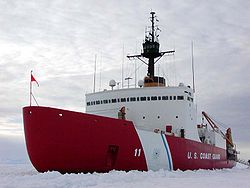
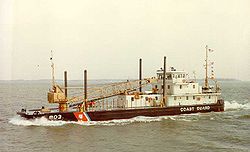
- 420' Icebreaker HealyUSCGC Healy (WAGB-20)USCGC Healy is a research icebreaker put into commission in 1999 by the United States Coast Guard.-Construction:Healy was constructed by Avondale Industries in New Orleans, Louisiana and named in honor of Captain "Hell Roaring" Michael A. Healy U.S.R.C.S. Her keel was laid on September 16, 1996...
(WAGB) - 418' National Security CutterNational Security CutterThe United States Coast Guard National Security Cutter , also known as the Legend class and Maritime Security Cutter, Large, is one design among several new cutter designs developed as part of the Integrated Deepwater System Program....
(WMSL) - 399' USCG Polar-class icebreaker (WAGB)
- 378' High endurance cutterHigh endurance cutterThe designation of High endurance cutter was created in 1965 when the United States Coast Guard adopted its own designation system. High endurance cutters encompassed its largest cutters previously designated by the United States Navy as Coast Guard gunboats , Coast Guard destroyer escorts , and...
(WHEC) - 295' (WIX)
- 282' Medium Endurance Cutter (WMEC)
- 270' Medium Endurance Cutter (WMEC)
- 240' (WLBB)
- 230' Medium Endurance Cutter (WMEC)
- 225' Seagoing Buoy Tender (WLB)
- 213' Medium Endurance Cutter (WMEC)
- 210' Medium Endurance Cutter (WMEC)
- 179' (WPC)
- 175' Coastal Buoy TenderUSCG Coastal Buoy TenderThe United States Coast Guard commissioned a new Keeper-class of coastal buoy tenders in the 1990s that are 175 feet in length and named after Lighthouse keepers.Keeper Class cutters serve the Coast Guard in a variety of missions...
(WLM) - 160' Inland Construction Tender (WLIC)
- 140' Icebreaking Tug (WTGB)
- 110' (WPB)
- 100' Inland Buoy Tender (WLI)
- 100' Inland Construction Tender (WLIC)
- 87' Marine Protector class coastal patrol boat (WPB)
- 75' River Buoy Tender (WLR)
- 75' Inland Construction Tender (WLIC)
- 65' River Buoy Tender (WLR)
- 65' Inland Buoy Tender (WLI)
- 65' Small Harbor Tug (WYTL)
Historic USCG cutter classes and types
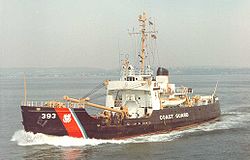
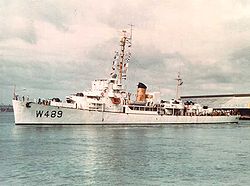
- 327' (WPG)
- 311' (WAVP)
- 306' (WDE)
- 255'
- 250'
- 240'
- 213'
- 205'
- 180' Seagoing buoy tenderUSCG Seagoing Buoy TenderThe Seagoing Buoy Tender is a type of U.S. Coast Guard cutter originally designed to service aids to navigation, throughout the waters of the United States, and wherever U.S. shipping interests require. The Coast Guard has maintained a fleet of seagoing buoy tenders dating back to its origins in...
(WLB) - 180' Oceanographic vessel (WAGO)
- 165'
- 165'
- 165'
- 157' (WLM)
- 133' (WLM)
- 125' (WSC)
- 123' Patrol boat (Deepwater Modified) (WPB)
- 110' (WYTM)
- 110' (WYT)
- 95' (WPB)
- 82' (WPB)

